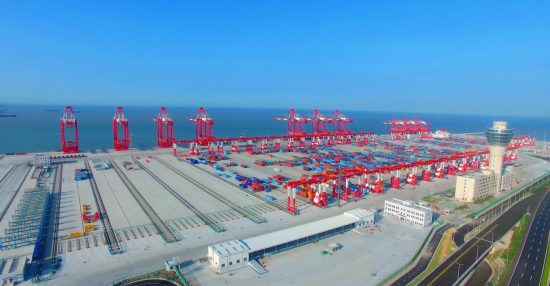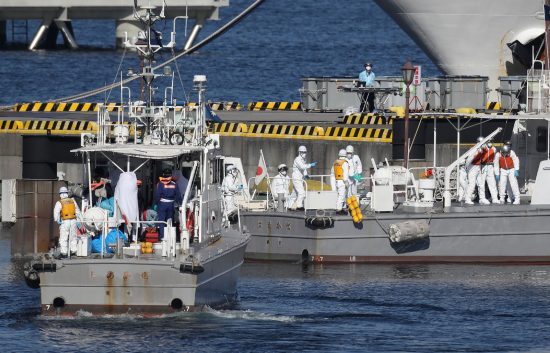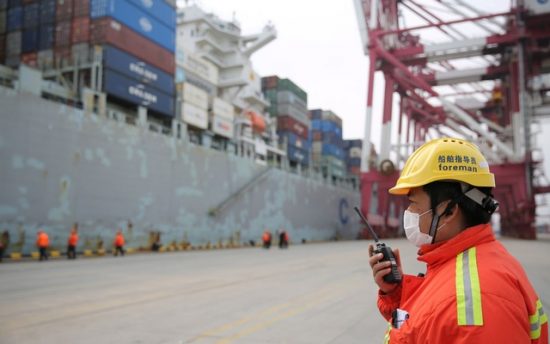News about coronavirus has been deluging the Internet and TV for a while now. As of 7th of February there are 31 493 confirmed cases, 638 people died and 1563 recovered. The majority of your compatriots might view these reports as another thriller happening, perhaps, not a long time ago, but in China far, far away…
Meanwhile, 2019-nCoV is a harsh reality for those who have a job a sea. Maritime community has a much higher risk of exposure; not to mention logistic and economical affect that has already been experienced by the shipping industry. Let’s review the measures which port authorities impose to contain the outbreak of novel coronavirus and the general impact of disease on maritime industry.

Restrictions of Ship Operations
Many countries have issued the list of requirements that vessels’ crew must adhere to in order to contain the deadly virus. The strictest health control regime is naturally imposed in China itself and the neighboring countries.
China: (last updated 4.02.20)
- Berthing is allowed in ports of Tianjin and Xiamen upon completion of Health Declaration. Customs officers will come onboard to take temperature of each crew member in Dalian.
- Berthing is suspended in Putian and Quanzhou; while 14 days’ quarantine is required in the port of Ningbo.
- Crew change is prohibited in the ports of Shanghai, Xiamen, Ningbo, Tianjin, Dalian, Qingdao and Guangzhou. Though the last two ports allow to proceed with crew change in emergency situations.
- Disembarkation of crew is banned in all ports around the country.
- The crew must wear facial masks when dealing with port personnel and report any signs of respiratory illness to Port Authorities immediately.
- Some delays are reported in loading/discharging in the ports of Shanghai, Tianjin, Huanghua, Lianyungang, Jingtang and Caofeidian due to the lack of personnel and truck drivers authorized to enter these ports.
- Provision should be ordered at least 24 hours in advance in ports of Tianjin and Qingdao.

Singapore:
The Maritime and Port Authority of Singapore (MPA) are battling with the outbreak of novel coronavirus with health advisories on each sea checkpoint. All arrivals are subjected to temperature measurement and those with a travel history to mainland China within the past 14 days have to undergo an additional screening.
Australia:
This country has implemented much more serious protective measures which complicate life of seafarers significantly.
- Master is required to submit a crew health report 12 hours before arrival.
- Vessels coming directly from China which have spent less than 14 days at sea will be refused pilotage or port services until the period of 14 days expires.
- If any crew member oк passenger reports any suspicious symptoms, a biohazard officer will come onboard for further inspection.
- Agents/Master are required to submit information about the vessel’s 5 prior ports of call.
- If the vessel has called to mainland China recently; it is also required to provide: departure date, transit ports of call, onboard health report.
Philippines:
On the 4th of February 2020 the Philippine Ports Authorities (PPA) have issued rather strict quarantine requirements.
- Vessels which have called to ports of China (including Hong Kong and Macao SAR) are to berth in the special quarantine anchorages. Upon arrival a yellow flag should be raised on a foremast; while crew is denied disembarkation until free pratique is issued by the Bureau of Quarantine.
- If any flue like symptoms are registered onboard of any vessel; Master must report to port authorities and adhere to a 14-days quarantine.
- Cruise ships which have passed through any China ports within the past 14 days are denied entry to all ports.
- Other cruise and cargo vessels may operate as usual on condition hygienic measures are in place at all times.

USA Ports:
The United States deal with the novel coronavirus within the lines of 42 CFR 71.21 regulations. Vessels are required to declare any sick or deceased crew member or passenger 15 days prior to arrival at any US port. If any symptoms of communicable disease manifest onboard, the crew will receive further guidance from CDC.
Other Ports:
All crew members will be asked to fill out special self-check forms in Gibraltar before disembarkation. Medical screening and 48-hours health report are mandatory in Malaysia ports. Moreover, disembarkation is possible only by special license even after screening.
There are no restrictions in Russian ports yet; however, boarders are closed for travelers in the Far East. South Korea has put up special Quarantine Stations where crew from vessels which have called to China are examined and asked to fill out a special questionnaire.

General Impact of Coronavirus on the Shipping Industry
Although it might be too early to evaluate all consequences of the outbreak of the novel 2019-nCoV now, it is already obvious that an impact on the shipping industry indeed on the global economy will be massive.
Modest reports of delays in the Chinese ports hide a decrease in port operations by 20% since the 20th of January (according to Alphaliner) and there are still fewer bookings for the rest of February. Moreover, industries in China are shutting down gradually in the effort to contain infection, so there is less demand for oil, ore and LNG. Tanker and bulk carrier owners which have always praised China as their primary market now expect Q1 to be in red due to the lost demand. It doesn’t help that freight rates for crude carriers fell around 40% last week.
Containership market suffers severely either. CMA CGM, Maersk, Evergreen and other companies have already announced that they have suspended their important Asian – European lines until the epidemic situation in under control. Analytics claim that shut down of factories (till 9th of February so far) will entail a 0.7% decline in the world’s container market as China is the major exporter of goods.
Unexpected problem has occurred with regards to 2020 IMO Sulphur Cap. A lot of vessels were scheduled for scrubbers installation at Chinese shipyards. Now the process is suspended and owners have to cope with monstrous fuel prices; while those already at shipyards are virtually imprisoned onboard of their vessels facing several weeks’ delay.

Credits to Cruise Industry News
Cruise Ship market is not optimistic either. Royal Caribbean has now cancelled the New Years’ voyages Spectrum of the Seas their luxurious cruise liner based in Shanghai. The company expects more cancellation due to the aggravated quarantine situation and reports that every lost cruise means USD 3 – 4 million losses in revenue.
The situation is aggravated by the case of Diamond Princess – the Princess Cruises’s ship with 3700 passengers that is now quarantined at Yokohama. There are now 61 confirmed cases onboard; and the whole story started with 1 passenger that left in Hong Kong on the 25th of January and later tested 2019-nCoV positive.
Global Economy
It is impossible to evaluate a final impact of the outbreak on the global economy at present. SARS cost global business USD 60 billion in 2002, but it had recovered remarkably quickly after an epidemic. The novel coronavirus has already killed more people than SARS. Moreover, there is more economic and logistic interaction between countries in 2020; people travel more spreading the virus; and there is far more intensive trade that is at risk now. Therefore, the impact of disease will depend on how successfully the international community battles with 2019-nCoV and how quickly it ceases.

